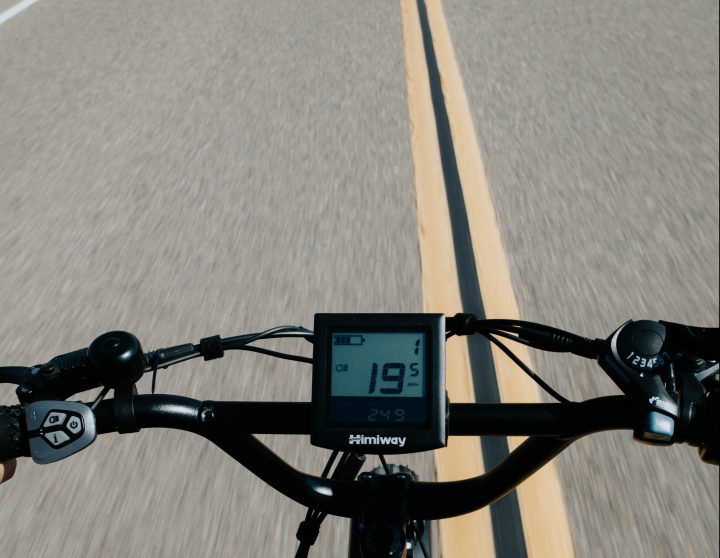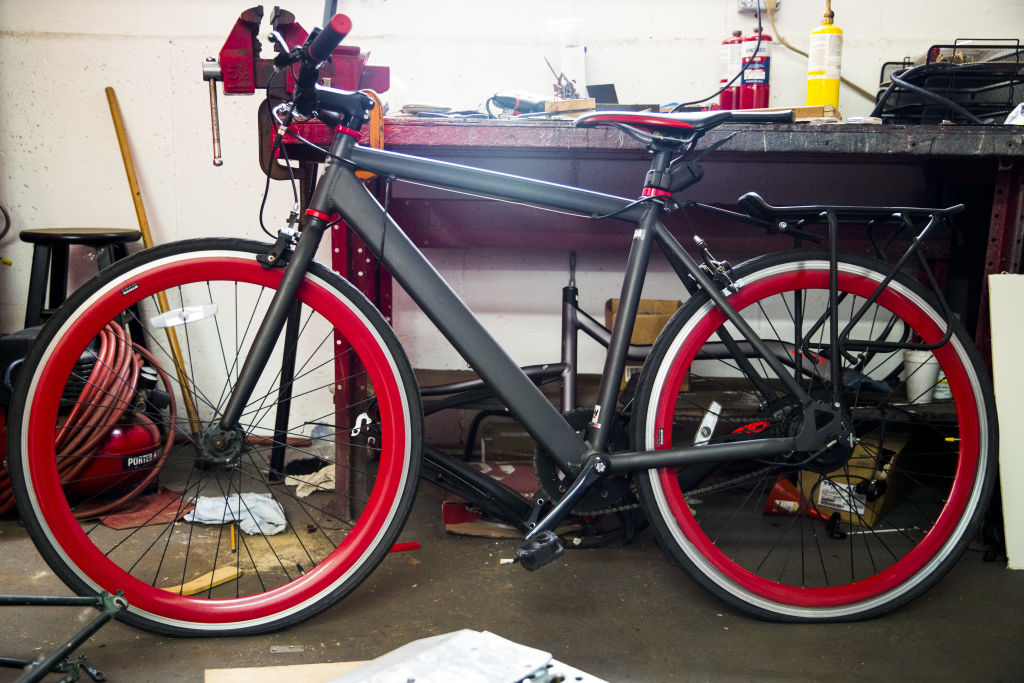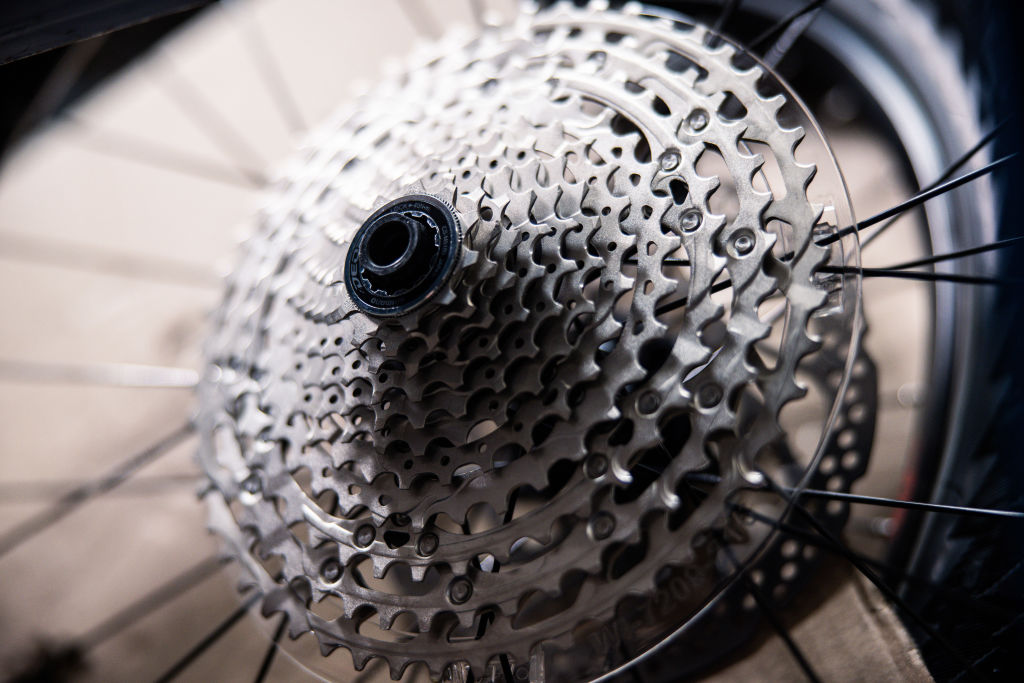REFLECTION
How an e-bike changed my life

Twenty-two enthusiastic mountain bikers, followed by SANpark honorary rangers and a sweep vehicle, went cycling in the Addo Elephant Park in April 2023.
Neither the friend who joined me, Christa, nor this writer are cyclists, but sometime before the event we made a pact to live daringly and were determined to challenge ourselves. Christa’s mantra is “not let the old man in”; thus, soon thereafter, when a mail with the heading “Tour de Addo with an MTB” popped up in Christa’s inbox, she took it as a sign that our moment had arrived.
The advert gave details of a five-day cycling trip through the Addo in parts that were off limits to the public. Daily distances ranged between 25km and 50km and e-bikes were allowed; a game drive vehicle accompanied the group – it could give those who were exhausted a chance to rest their legs, which in turn made the event accessible to everyone.
Since we were convinced that the Karoo was mostly flat, we signed up. Proceeds of the trip were donated to a conservation fund, food and accommodation were provided and all we had to do was arrive.
For those unfamiliar with e-bikes, they are bikes fitted with an electric motor and battery which makes pedalling easier; they have various settings depending on how much additional power you need. Being able to use e-bikes levels the playing field and allows average cyclists to keep up with serious ones.

An e-bike in the service area of a shop in Watertown, Massachusetts, US, on 8 May 2020. (Photo: Adam Glanzman / Bloomberg via Getty Images)
On arrival at the camp we were introduced to the group: ages ranged between 45 and 70, and surprisingly, most riders arrived with e-bikes. Some in the group were competitive cyclists while others cycled socially. I felt quite embarrassed that I was neither, and my bold decision to join seemed foolish now. The Karoo was also much more mountainous than I had anticipated, which added to my insecurity.
Later that day, the tour guide handed us our e-bikes and gave us a briefing on how they worked. I don’t have a technical bone in my body and the last time I cycled regularly was to school through leafy suburbs 50 years ago.
The next morning we set off at 8am. The mountain tracks turned out to be even more daunting than expected so Christa and I decided that we would cycle at our own pace. The previous week the area had heavy rain that damaged the cycling tracks; gravel roads had turned into rocky wash-aways with ravines hidden underneath puddles. We were advised to speed-up rather than slow down to manage the puddles. This was a scary prospect and we decided it was safer to push our bikes around the dongas.
By the third day we had the hang of it and felt more confident. Although there were moments of adrenaline and others of sheer exhaustion, we had plenty of time to enjoy the blue skies, the smells of the bush, the fresh air, the exquisite Karoo plains and a large variety of game.
Evenings were exceptional and as the sun started casting long shadows, the group gathered in the open-air lapa. Drinks were served and there was excited chatter about past and present experiences, a camaraderie between like-minded people developed. Once the sun set, the sounds of predators in the distance could be heard and thousands of bright stars scattered in the sky. It created a magical ambience and made me acutely aware of the immensity and wonder of the universe. The friends we made and the feeling that we’d achieved our goal made the trip priceless.
Cycling with an e-bike
Professor Hellen Myezwa, head of the School of Therapeutic Sciences at Wits, says she and her husband are weekend cyclists. They prefer cycling on roads in the Magaliesburg area where they do between 35km and 60km on Saturdays.
She smilingly explains that she was introduced to cycling when her husband bought her a mountain bike instead of a diamond ring. In the past she was reluctant to join him on long outrides because he is stronger and cycles more regularly. Switching to an e-bike three years ago changed this entirely and now nothing is off limits.

An 11-speed gear cassette on the wheel hub of an e-bike on the assembly line at the Accell Hunland Kft plant in Toszeg, Hungary, on 7 September 2022. (Photo: Akos Stiller / Bloomberg via Getty Images)
They have fun together and enjoy the social aspect of cycling. It helps to clear her head after a stressful week and the exercise helps maintain her weight. It’s also low-impact, builds strength and improves cardiovascular health. In the past, it helped her recover from a niggle in her knee. After she had Covid helped her regain strength because she could regulate the power and resistance of the e-bike.
Roger de la Harpe, a wildlife photographer, says “e-bikes have changed our lives in ways that were unimaginable”. Since converting to e-bikes in 2015, Roger and his wife, Pat, have cycled about 15,000km. For them it is the perfect way to explore the country. They have cycled in Germany, Austria, Switzerland, France, Alaska and Canada. Their favourite routes are in the Karoo with its breathtaking sunsets. They have lived and cycled in KwaZulu-Natal and Knysna and recently moved to Onrus in the Western Cape.
Since there was little information about trails they created a website to share their experiences. It gives information about trails, GPS tracks, the terrain, where to stay and restaurants in the vicinity. It is packed with advice and beautiful photographs of places they have visited. Their best tip for anyone starting out is to buy a bike that’s fit for purpose.
Martin van Rensburg, owner of Ride Life in George, says e-bikes are becoming increasingly popular. The original sentiment that it was cheating is no longer an issue. Customers are keen to buy e-bikes to commute to work or to meander around their neighbourhoods. E-bikes are environmentally friendly and less expensive than maintaining a car. Some buy them to experience nature and for the challenge of completing trails that are technically tricky.
Which e-bike to choose?
There are basically two types, a hub-drive and a mid-drive, and depending on your needs, the one might be better suited than the other.
Hub-drive bikes are cheaper and generally have front-drive suspension only. They are ideal for cycling around neighbourhoods or commuting short distances on even terrain.
When it comes to off road e-bikes, quality and specs start to matter. These are usually mid-drive bikes with dual suspension. The battery sizes range between 360 and 800 watts depending on the distance you plan to cycle. Van Rensburg says a good place to start when considering an e-bike is to ask friends which they prefer.
The competition among well-known brands such as Giant, Bosch, Trek and Shimano is fierce and the price difference between bikes with the same specs is usually minimal. He believes it is crucial to buy from retailers where there is good after-sales service – you could pay less for an unknown brand, but then spare parts could become a problem.
At the moment a quality off-road, dual-suspension bike starts at about R70,000. The lifespan of a bike is currently unknown. The battery usually comes with a standard guarantee for at least 500 charge cycles. If you cycle 100 times a year it gives you about five years before the battery’s capacity might drop. Van Rensburg says treating it well will give one many years of pleasure. Most races also allow them, although the cyclist isn’t part of the competition.
Justin Perel, who imports Econtron e-bikes from China, says some unknown e-bike brands are gaining popularity and market share. They are excellent value for money and start at about R33,999 and the specs compare favourably with the main brands. Most of the parts are generic, and replacing them isn’t difficult. Even if the motor breaks down there are new ones available. He says you should look at customer reviews before buying. So, if you are in a rut, an e-bike might be the best thing to rev up your life. DM


















 Become an Insider
Become an Insider
Started cycling in 2020 during Covid19 and soon changed my 10 year old bike to an e-bike. Hey I was in my mid 50’s and I knew that this was going to be a good investment in my health. Initially as a novice and pretty clueless mountain biker, I arrived feeling anxious for my training lessons. What was I thinking! Within a few weeks the experience became rejuvenating, fun, de-stressing, uplifting and calming. The MTB trails in Cape Town are just exquisite. I love my e-bike!
I will qualify for an e-bike when I turn 80.